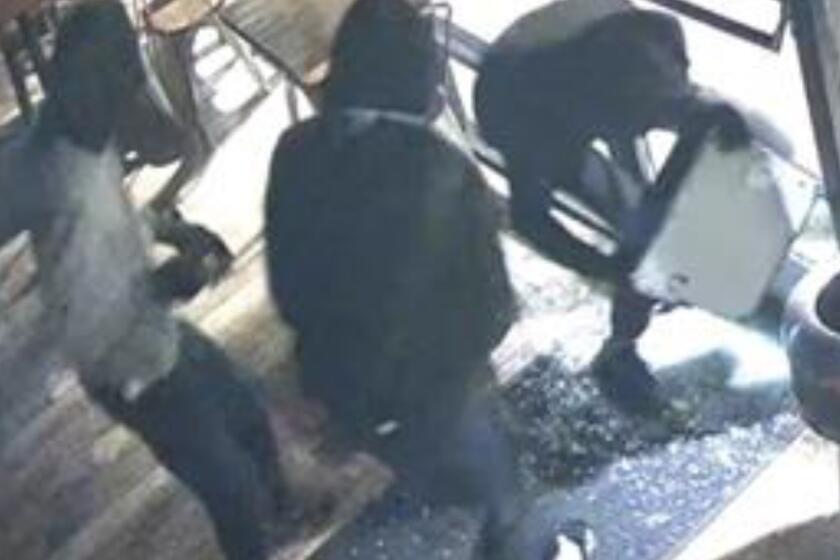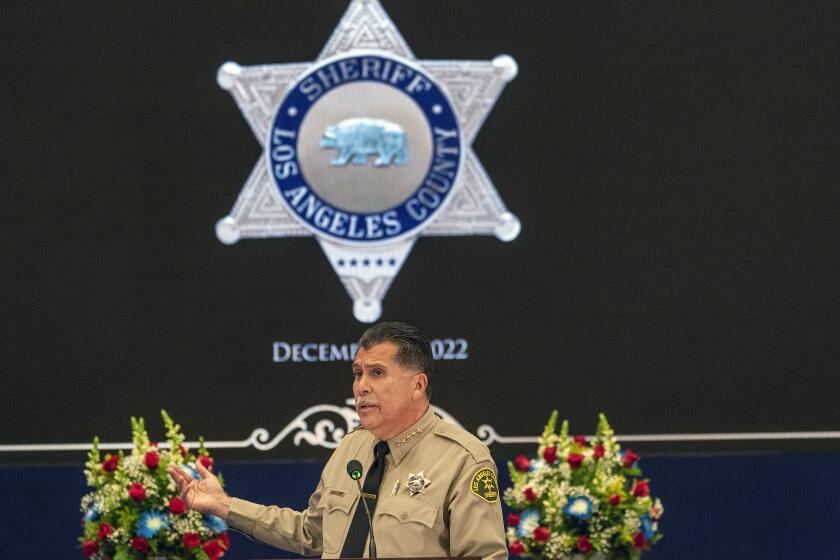Wrongly convicted man wins suit
Finding that a sheriff’s detective had falsified evidence, a federal jury in Los Angeles ordered Riverside County on Monday to pay $2 million to a man exonerated by DNA evidence after serving 12 years in prison for rape.
The verdict came 19 years after Herman Atkins was sentenced to 45 years in prison for a 1986 rape and robbery in Lake Elsinore.
Atkins steadfastly maintained his innocence. In 2000, DNA tests conducted by Richmond, Calif., forensic scientist Edward Blake, and later confirmed by the FBI, eliminated Atkins as a source of semen found on the victim’s sweater. The actual rapist was never identified.
Two years later, Atkins filed a civil damage suit alleging, among other things, that sheriff’s Det. Danny Miller had fabricated evidence and withheld information that raised doubts about whether he committed the crime.
Specifically, the attorneys said Miller submitted a statement attributed to a man named Eric Ingram. The statement said Ingram knew Atkins to be a gang member and that he had seen Atkins in the Lake Elsinore area in early April 1986. The rape occurred April 8, 1986.
In papers seeking an arrest warrant, Miller said Atkins “has been identified and linked to the Perris/Elsinore area by an uninvolved and therefore unbiased witness.”
Sixteen years later, after Atkins had been released from prison, a private investigator tracked down Ingram, who signed a sworn statement saying he did not know Atkins and had not told Miller he had seen Atkins in the vicinity of the crime.
Atkins was represented in his fight to overturn his conviction by lawyers from the Innocence Project at Cardozo School of Law in New York. His civil lawyers, Peter Neufeld, co-director of the project, and Deborah Cornwall, of Cochran Neufeld & Scheck law firm, contended that evidence of the fabrication could have persuaded the jury to acquit their client. The six-woman, two-man federal jury agreed, responding “yes” to a question on the official verdict form:
“Did Atkins prove, by a preponderance of the evidence, that Miller failed to disclose favorable information to the prosecutor; specifically that he fabricated the Ingram statement.”
Atkins, in an interview after the verdict, said he was pleased.
“When I was in prison, one thing that motivated me was something my grandmother often said to me. She said, ‘A lie will die, but the truth lives on.’ Today, Detective Miller’s lies were not only exposed but put to rest, and the truth lives on as my grandmother said,” he said.
Atkins, now 41 and living in Fresno, said he hoped to start a graduate program in psychology or go to law school. He and his wife have started a small foundation to help others who have been exonerated adjust to life outside prison.
When Atkins was freed in 2000, he was the 69th convicted person in the U.S. to be declared innocent as a result of DNA testing. Last week, a Chicago man was exonerated of an old rape conviction, becoming the 200th DNA exoneration.
“In half of the wrongful-conviction cases, there was police or prosecutorial misconduct,” said Neufeld, co-founder of the Innocence Project.
“What is most troubling about this case is that it is clear that Det. Miller fabricated evidence to charge an innocent man and Riverside County reexamined what went wrong, continued to promote Det. Miller and to this day has never issued an apology to Herman Atkins,” Neufeld said.
Miller has retired and is now working for the FBI in Arkansas, according to statements made by a lawyer for Riverside County during the civil case. A spokesman for the Riverside County Sheriff’s Department declined to comment, referring calls to the county counsel. Riverside County was represented by private attorney Arthur Cunningham. Attempts to reach him for comment were unsuccessful.
Monday’s verdict came at the end of Atkins’ second damage trial. In September, U.S. District Judge Percy Anderson declared a mistrial after a jury deadlocked over Atkins’ damage claim. The U.S. 9th Circuit Court of Appeals removed Anderson from hearing the retrial, saying his impartiality in handling the case “might be questioned.” Atkins’ attorneys had repeatedly complained that Anderson was biased against their client.
More to Read
Start your day right
Sign up for Essential California for news, features and recommendations from the L.A. Times and beyond in your inbox six days a week.
You may occasionally receive promotional content from the Los Angeles Times.






